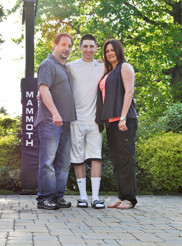He doesn’t allow his autism to define him
Lawrence Woodmere Aacdemy's Tristan Braverman knows how to overcome challenges
Tristan Braverman, a junior and a varsity basketball player at Lawrence Woodmere Academy, used to blend in with the rest of the student body, but after being featured in the May/June issue of ESPNHS magazine, his teammates and fellow classmates learned something about him they didn’t know.
When Braverman, now 16, was 15 months old, his parents, Stacy and Steve, would call his name but he wouldn’t respond. “The doctor told me to put his high chair in the kitchen, facing away from me, and to go up behind him and slam pot covers together to see if he would respond — and he didn’t move,” Stacy recalled. “We thought he was deaf.”
Doctors performed several tests on Tristan, and he was diagnosed with autism, which affects the brain’s normal development of social and communication skills. The Bravermans, who live in Merrick, signed up for early-intervention services and fought to get their youngest son all the services they could. “It was the mid-1990s, so autism was relatively new,” Steve said.
On the Internet, Stacy found a doctor in California who said that applied behavior analysis therapy — teaching social, motor, verbal and reasoning skills to children who might not learn them independently, as other kids do — was the only way children with autism would improve. “There were five or six therapists in my house for eight hours a day,” she said. “I didn’t get out of my pajamas. In my downtime I took over between therapists, and it seemed like forever, but eventually he started talking.”
This school year was Tristan’s first year on the varsity basketball team, and he never felt the need to tell his teammates about being autistic. “It just happened to come up in the [ESPNHS] article,” he said. “It brought more attention to it. They were all surprised, but it doesn’t matter if they know, because no one notices anything different about me.”
The team’s coach, Jeff Weiss, said that if he didn’t know about Braverman’s autism, it would be hard to know he had any condition. “It’s truly amazing what this young man has achieved on the basketball court,” Weiss said. “In some ways, maybe it forces Tristan to concentrate more than the next kid, but we all treat Tristan like one of the guys, as he is completely dedicated to the game of basketball and to our team.”
Braverman credits his parents for taking the initiative to get him early-intervention therapy to help him develop social skills. “The majority of autistic kids are not able to socialize with people, and I’m able to make friends,” he said. “I give my parents a lot of credit because they got me what I needed.”
Looking at the videotapes of her son working with therapists as a child, Stacy gets choked up as she realizes how far he has come. “In the beginning, when he was diagnosed, a neurologist told me he was going to have to be put in a home because we won’t be able to restrain him when he has outbursts,” she said. “I told myself it didn’t matter what I had to do, I’d do it. I took that as a challenge, and now I look back at the videos in amazement.”
Tristan said he hopes to serve as an example for parents with autistic children. “Because I got the treatment I got, that is why I am the way that I am now,” he said. “Get whatever you can and do everything in your power to try and fix it.”
With the end of his high school career nearing, Braverman’s dream is to become a professional basketball player, but he has other plans, too, if that doesn’t work out. “I’m planning to study medicine in college,” he said. “Science has always interested me and I’m good at it.”
Whichever career path he chooses, his parents are there to support him along the way. “He’s easygoing, and I feel better letting him venture away from the house,” Stacy said. “He takes everything in stride, and I feel like I don’t have to worry about him.”

 41.0°,
Fair
41.0°,
Fair 




